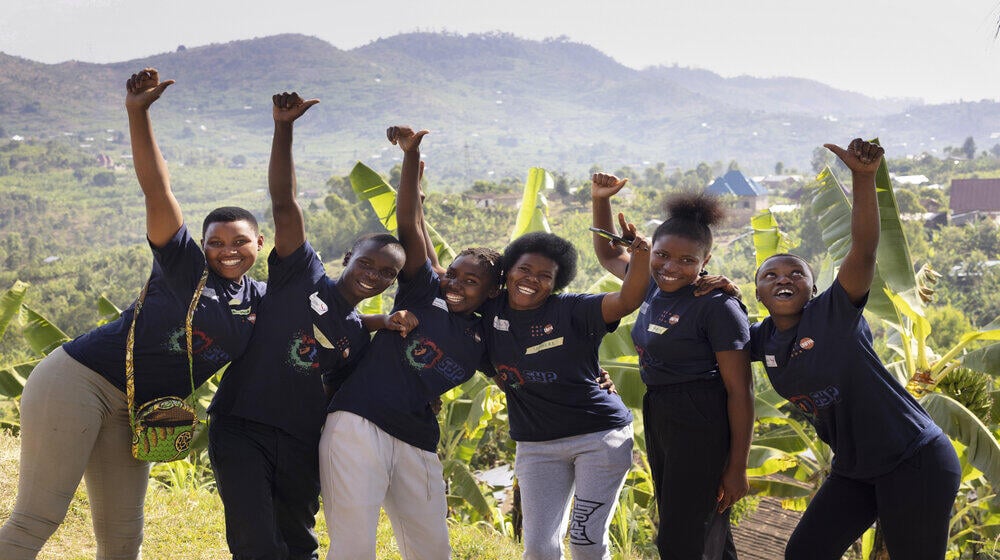Rwanda, 11 July 2023 - Today, we celebrate World Population Day 2023 under the theme: “Unleashing the power the gender equality: “Uplifting the voices of women and girls to unlock our world’s infinite possibilities” and translated into Kinyarwanda as, “Umunyarwanda afite amahirwe menshi, twimakaze uburinganire,” we must advance gender equality through empowering women and girls to exert their rights and make decisions, especially autonomy over their lives and bodies.
Women and girls make up 49.7 per cent of the global population. Yet their desires for their lives, families and careers are often ignored in discussions on demographics and their rights violated in population policies. The result is a world that excludes, marginalizes and limits the potential of every other person on the planet – a problem that will prevent all of us, not just women and girls, from experiencing a more prosperous, peaceful and sustainable future.
Gender inequality creates a power imbalance between men and women, girls and boys, and is harmful as it violates the rights and choices of women and girls.
“Thirty years ago, the world united behind a shared vision of the future, one that recognized the rights of women and girls as central to global development. The solution is clear: Accelerating the advancement of gender equality – through access to sexual and reproductive health and rights, improved education, appropriate labor policies, and equitable norms in the workplace and home – will result in healthier families, stronger economies, and resilient societies,” said Dr. Natalia Kanem, UNFPA Executive Director
Women's and girls' right to equality matters everywhere
Rwanda has made many positive strides in advancing gender equality and women's empowerment, including improving the quality of life of its citizens. Rwanda is leading the world as the first country with the highest number of female parliamentarians (61.3%) and is ranked 6th globally among countries that have significantly narrowed the gender gap (Global Gender Gap Index 2022) up from the 9th position in 2020. Notable progress has equally been recorded in life expectancy at birth, which increased from 64.5 years in 2012 to 69.6 years.
According to the 5th Population and Housing Census 2022, the resident population grew at an increased rate of 2.3% annually over the last 10 years, reaching 13.46 million. Despite the seemingly rapid growth, the fertility rate fell gradually from 8.2 births per woman in 1973 to 3.6 births per woman in 2022, a trend that may raise concerns in certain circles over further reduction to lower-than-population replacement levels of 2.17 children per woman in the long run.
But the issue is not about “too many” or ‘too few’ people; the issue is of simplistic narratives, which tend to present fertility rates as a problem to be solved, thereby, reducing women’s bodies to political battlegrounds and denying half the population their right to bodily autonomy.
"The 2023 landmark report, 8 Billion Lives, Infinite possibilities for the case of rights and choices, showcases the rising world population and urges rethink of how countries tackle changing demographics. In this context, there is a necessity for more collective efforts to address the rights of women and girls, aimed at achieving SDG 5 on Gender Equality. Achieving unlimited access to quality education as well as acquiring livelihood skills are key to gender development and equality."- Mr. Kwabena Asante-Ntiamoah, UNFPA Representative
The need for a sustainable future built on rights and choices for all
In a world in which 8 billion can thrive, we must look to proven and effective solutions to mitigate our world’s challenges and achieve SDG 5 on gender equality, while prioritizing adolescent, sexual and reproductive health and rights (ASRHR) for all.
Together with the Government of Rwanda, UNFPA as a member of the UN system is looking at innovations and high-impact interventions to support the realization of universal access to sexual and reproductive health including adolescents and young girls. Specifically for adolescents and young people, such efforts include context-sensitive, age-appropriate and scientifically accurate comprehensive sexuality education for in and out-of-school alongside access to youth-friendly health services. As UNFPA, we are committed to listening to the voices of women and girls, better understanding their needs, and echoing their calls for equality in every sphere of socio-economic and governance.
UNFPA as the lead agency on sexual and reproductive health and rights supports a diverse, thriving world of 8 billion people - full of infinite possibilities for women and youth in Rwanda and across the globe.


